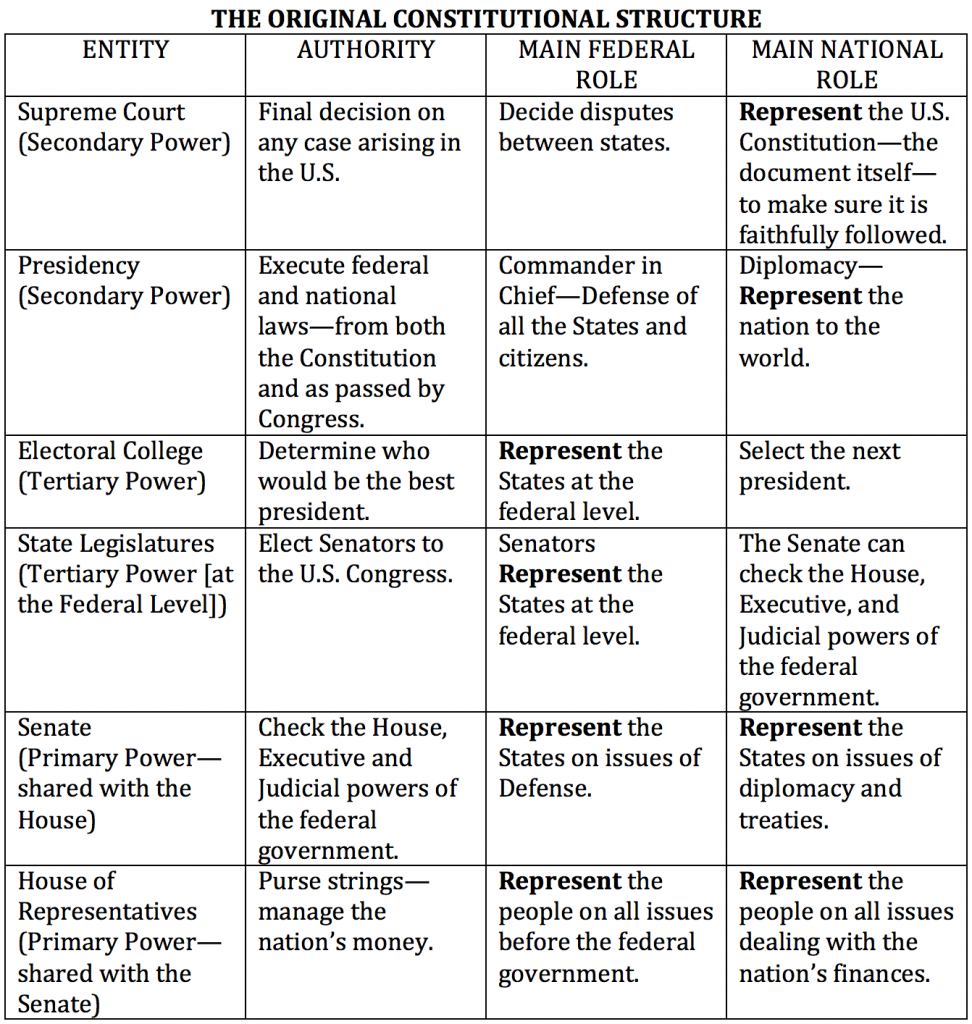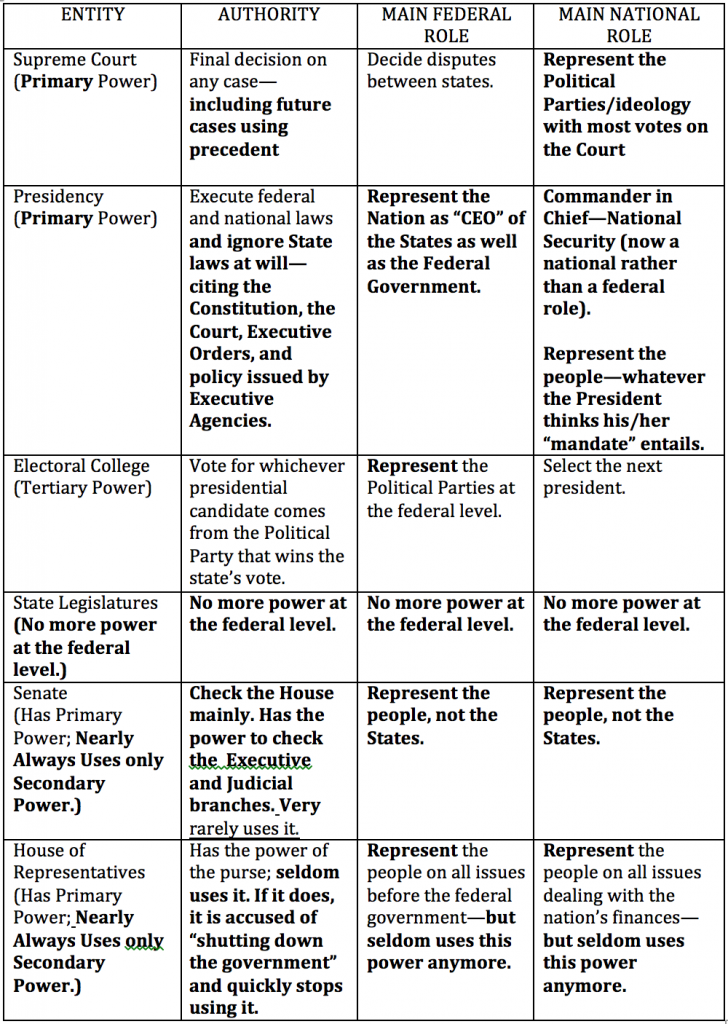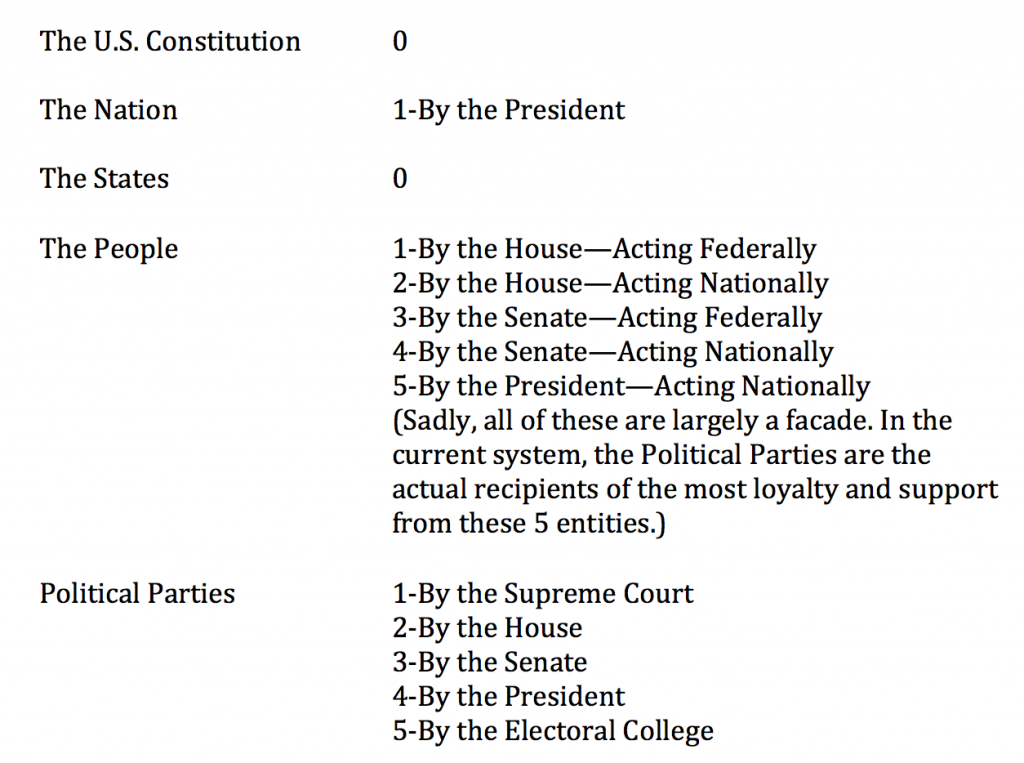Why Populism? by Oliver DeMille
July 6th, 2016 // 7:46 am @ Oliver DeMille
Pendulum Swinging
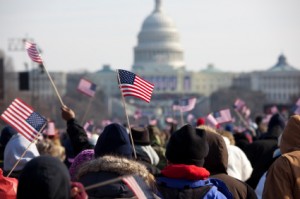 We’ve heard a lot about populism during the election, and we’re going to hear a lot more. Why? Because the elite media is in serious shock.
We’ve heard a lot about populism during the election, and we’re going to hear a lot more. Why? Because the elite media is in serious shock.
They expected Hillary Clinton’s success, but the rise of both Trump and Sanders has astonished them.
Result: they’re writing and talking a great deal about “populism,” and the “dangers” it brings to our nation.
By the way, these tend to be the same journalists and media professionals who consistently tout the United States as a “democracy,” not a “republic” or “democratic republic.”
They promote “democracy, democracy, democracy” as the greatest governmental system ever, and then act shocked and worried when populism shows up to an election.
The irony is that populism is simply what happens when more voters than usual get actively involved in the process. In other words, America engages in populism during the years it acts the most democratic. Why are the elites concerned?
Answer: They like the kind of “democracy” where the masses are consistently swayed by the media—where expert elites tell the populace what to believe, and the electorate votes accordingly. This is what most members of the elite class actually mean when they use the word democracy.
Personally, I like Francis Fukuyama’s definition. He said:
“‘Populism’ is the label that political elites attach to policies supported by regular citizens that they don’t like.”
Funny how that sentence is written. Does is mean the political elites don’t like the policies? Or that they don’t like the regular citizens? I think it means the latter. But maybe not. Perhaps it means both the policies and the regular citizens.
Fukuyama notes that populist voters sometimes choose poorly, but “elites don’t always choose correctly either.” Very true. And in our current historical context, the worst-case scenario would be another elitist choice for president. Elites have increased in power far too much in the past three decades, and it’s time for the pendulum to swing back to the power of the people.
I. 3 Positive Developments
Here’s the “good news,” so to speak, about the current rise of populism:
#1
As Fukuyama also pointed out, this wave of populism is weakening both of the major political parties. The Democrats are losing large segments of their working class base and moving even more to the party of “a bunch of special interest groups,” while Republicans are almost violently split between the “big business crowd” and working class voters. Indeed, working class populists from both parties are now behaving like a formidable force.
#2
On a structural note, the framers of the U.S. Constitution didn’t want the president to be elected by mass vote. This is why they established the Electoral College—which originally worked with each state sending its representatives, rather than the people voting in a mass presidential election at all.
Fortunately, the people usually sense it when things are out of kilter. The framers put the people in charge of electing the House of Representatives in large part because the House controlled the nation’s money. But since the House seldom uses its power of the purse anymore like it should, and the White House now has the de facto say over money, the people are using their power to choose a president—like they once would have selected members of the House.
This structural shift if ironic: The masses, divided by congressional district (which is exactly how they oversaw the purse strings under the original Constitution), will select the president and largely determine the future spending of our nation. In other words, if the House shirks its job, the people switch their populism to the branch of government they think will do their will.
The elites see it happening, and they can’t stand it.
#3
Maybe that’s the best thing about this election. Regardless of what you think of Sanders or Trump, both candidates have thrown a serious wrench into the way elites view the world. They are reeling. They aren’t in charge of this election like they assumed they would be—not so far, at least.
Make no mistake, they’ll get their bearings again and get back to their agenda—to grow government and increase the power, wealth, and influence of the elite class. They always do. This won’t keep them down for long.
But populism seems to be growing. Sanders and Trump didn’t create this momentum, they just benefited from it. Populist elections changed the power of Congress in 2010 and again in 2014. In 2016 we’ll find out if populism makes it to the White House as well. Again, however you feel about the specific candidates, the rise of populism is a positive in a nation where elites control far too much.
2: A DEEPER LOOK AT THE CONSTITUTIONAL STRUCTURE (THEN VS. NOW)
To see just how populism is important, let’s delve a bit deeper into the structural change to our governmental system. The framers established the following three branches and six entities to participate in the federal level:
Note that the following received direct representation under the provisions of the original Constitution: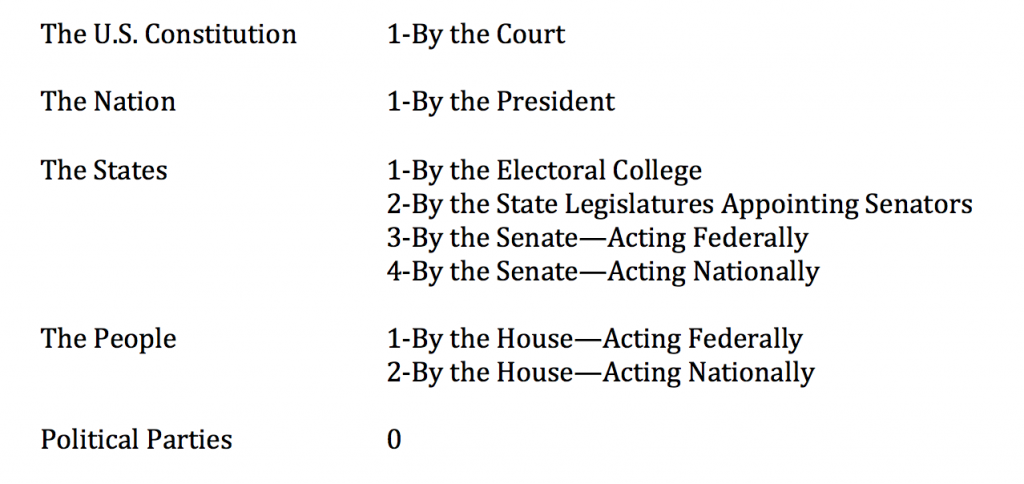
This entire arrangement was carefully thought out by the framers. They knew that the key to lasting freedom was to ensure that the States didn’t lose their power to the federal/national government, so they put in four protections against this (listed above). All were wiped out by the poor decision to adopt the 17th Amendment in 1913. (Ironically, this was ratified during an era of populism.)
Our oversized and overblown national government and corresponding loss of freedoms since that time are the natural result. The best solution would be to repeal the 17th Amendment and restore the proper balance of State and Federal powers.
The following chart shows how the government currently operates. Note that it is very different than the original constitutional arrangement:
THE STRUCTURE TODAY
(Items underlined are changes from the original Constitution
that are destructive to freedom.)
Look at how this has changed our governmental structure of representation:
Did you notice in all this that at the time of the American founding the primary entities of federal/national government were the House and the Senate, while the Court and Presidency were secondary? Compare that to now: the Presidency and Court act like primary branches of government, while the House and Senate act like secondary levels of government.
What the founders called “legislative primacy,” meaning that the people’s elected representatives in Congress had the final say on things through the purse strings, has been replaced by appointed officials in the Court and a huge Executive bureaucracy exerting the final say on most things.
Huge changes. All bad!
For The People
Now, if you’ve followed this article this far, congratulations! Here is the main point, the thesis, the reason for reading this and thinking about it:
Populism is attempting to correct the course of the American ship. Specifically, the populist elections of 2010 and 2014 both attempted to put the House and Senate back on track representing the people—not the political parties.
And the populist uprising of 2016 (among both Democrats and Republicans) is also arguing for the presidency to represent the people again, not the political parties. It’s not as good or as effective as repealing the 17th Amendment—not by a long shot—but at least the electorate is trying.
The voters (some knowingly, and most of them just by following their gut) are attempting to swing things back in the direction of government “by, of, and for” the people—instead of government “by, for, and of” the economic and power elites and their political party establishments.
Populism probably can’t get the ship all the way safely into port, but right now the people are at least trying to get things going in the right direction. If the voters keep at it, and don’t give up—and if they keep winning major elections—this new beginning can eventually be turned in the direction of a real and lasting solution.
Stay tuned…
Category : Aristocracy &Citizenship &Community &Constitution &Culture &Current Events &Economics &Education &Entrepreneurship &Featured &Foreign Affairs &Generations &Government &History &Independents &Information Age &Leadership &Liberty &Politics &Statesmanship
Don’t Worry, Be Happy! by Oliver DeMille
June 8th, 2016 // 12:08 am @ Oliver DeMille
Washington’s “Grin and Bear It” Message About an Economy that’s Still Struggling
The Need/Desire Question
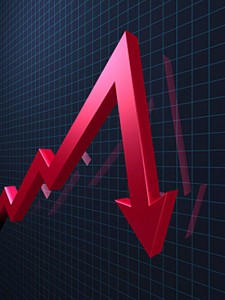 In a 1927 issue of Harvard Business Review Paul Mazur of Lehman Brothers wrote the following prescription for the nation: “We must shift America from a needs to a desires culture.” How? “People must be trained to desire, to want new things, even before the old have been entirely consumed. We must shape a new mentality in America. Man’s desires must overshadow his needs.” (Cited in The Happiness Equation by Neil Pasricha, p. 78.)
In a 1927 issue of Harvard Business Review Paul Mazur of Lehman Brothers wrote the following prescription for the nation: “We must shift America from a needs to a desires culture.” How? “People must be trained to desire, to want new things, even before the old have been entirely consumed. We must shape a new mentality in America. Man’s desires must overshadow his needs.” (Cited in The Happiness Equation by Neil Pasricha, p. 78.)
What a thing to say! And it has happened, just as Mazur recommended. But in the process, something else happened as well. Not only were people convinced to want more and newer things, but government got caught up in the same quest. And people began desiring many more and new things from government as well. This changed our entire culture.
More recently, President Obama has assured the nation that a slow growth economy is the new normal. But is this good news? Or very bad news masked by a smile? Truth: it’s certainly not good news. (See the new report: “The World is Flat: Surviving Slow Growth” in the March/April issue of Foreign Affairs)
But before we address this, let’s take a little quiz. Just for fun.
Messages and Meanings
The following quote is about what nation?
(1) “_____________ will not be able to grow its economy…without…privatizing state-owned companies, [and] loosening regulations…”
Or consider this:
(2) “It may have…an undervalued currency, a debt-to-GDP ratio of 250 percent, and an average annual GDP growth rate over the last decade of less than 1 percent…. [but] Life expectancy is among the highest in the world; crime rates are among the lowest. The…people enjoy excellent health care and education.”
One more:
(3) “Middle-class wages stopped rising more than 30 years ago, but…low interest rates…and easy credit obscured the problem, allowing people to bridge the gap between their stagnant incomes and their spending.” How? By going into massive debt.
What is most interesting to me about all three of these quotes is how applicable they are to the United States today. Just re-read item 1 above. It could be a very realistic (and important) “To Do” list for Washington in 2016. Yet it was written about today’s Russia under Putin. (Foreign Affairs, May/June 2016, p. 20)
Still, Washington does need to heed its message:
- privatize state-owned companies that are a drain on taxpayers and gum up the free market
- loosen regulations that are killing small business and sending investment capital to other nations
Item 2 above could also seem to be about the United States, but in fact it describes today’s Japan: “It may have…an undervalued currency, a debt-to-GDP ratio of 250 percent, and an average annual GDP growth rate over the last decade of less than 1 percent…. [but] Life expectancy is among the highest in the world; crime rates are among the lowest. The…people enjoy excellent health care and education.” (Foreign Affairs, March/April 2016, p. 50)
The intended message here is clear: “If the people have good health care, education, and a stable economy, everything is good. A growth economy isn’t necessary.”
Starts and Stops
In fact, in the United States, “Middle-class wages stopped rising more than 30 years ago, but…low interest rates…and easy credit obscured the problem, allowing people to bridge the gap between their stagnant incomes and their spending.” (Ibid., pp. 50-51)
But how have Americans masked falling wages? The answer is illuminating:
- By going into massive mortgage debt (eventually leading to the housing bubble crash and the Great Recession).
- By using credit cards, car loans, student loans and building up major consumer debt. The average U.S. household has over 97 thousand dollars of debt and growing. (The Motley Fool, January 2015)
- By more than doubling the amount of work they do, with both parents typically now in the full-time workforce, instead of just one breadwinner.
- By working longer hours. The average workweek in the United States is now 46.7 hours, not the 1950s model of 40 hours and a crisp 9-5 workday. (USA Today: Modern Woman, Fall/Winter 2015) Over the course of a month, that’s an extra 29 hours—almost an extra workday every week compared to American workers of the 1950s.
- By depending on increasing amounts of government support, including “free” public school education, “free” health care for those who qualify, and a number of even more direct government programs and assistance.
In all this, according to Gallup, less than 20 percent of U.S. workers love their job. Around 80 percent are in jobs they hate, dislike, or feel less than passionate about. Moreover, most Americans don’t believe that their current job will ever get them ahead financially. They’re just barely paying the bills—if that.
Still, the current message from Washington and labor experts is that things are fine, that the economy has improved under president Obama’s leadership, and that we should be grateful. Most people won’t see financial increases anytime soon, “but don’t sweat it.” Like people in Japan, we are assured that we should just be happy for general stability and get used to a stagnant economy.
Fewer jobs, more college-grads who are unemployed or (underemployed) and living with their parents, more three-generation households, falling home values, rising costs of food and necessities—these are the new normal. “And it’s okay,” Washington assures us. “If things get really bad, there are more government programs than ever to help you make ends meet.”
Don’t worry, be happy.
Regulations or Solutions
“Don’t desire so much anymore,” we’re told. “Make do with less. Except when it comes to big government. We’ll give you more of that!”
But how does this message from today’s Washington jive with the reality? Truth: “An economy that grows at one percent doubles its average income approximately every 70 years, whereas an economy that grows at three percent doubles its average income about every 23 years—which, over time, makes a big difference in people’s lives.” (Foreign Affairs, March/April 2016, p. 42)
Factor inflation into these numbers—on the basics like food, housing, education, and transportation—and one percent growth means the average household falls further behind each and every month. At three to four percent growth, in contrast, like the overall average from 1945-2005 in the United States, families can improve their standard of living over time—and even help their kids do better than themselves.
Right now this level of growth is found mostly in Asia, certainly not in North America or Europe. Thus the increasing American realization that our children and grandchildren are likely to be worse off than we are, while their Chinese counterparts will probably experience upgraded lifestyles and standards of living in the decades ahead.
But this isn’t a static reality. It is based on the current policies and agendas of Washington. These can be changed. For starters, just adopt the suggestions Westerners often give to Russia, as outlined above:
- reduce/remove numerous government regulations that are killing small businesses and driving investment capital and high-growth corporations—and jobs—to other nations
- stop federal overspending in so many government agencies by simply cutting their budgets—significantly—to spark increased investment and business growth
Just these two changes would significantly reboot the U.S. economy.
Americans can become a more frugal and a resilient people once again, no doubt. But they would rather be a more innovative and entrepreneurial people—and they have proven that they are incredibly good at it—if government will just cut away the red tape and let free enterprise thrive again.
(Read a lot more on this topic in Oliver’s latest book, Freedom Matters, available at The Leadership Education Store)
Category : Blog &Business &Citizenship &Community &Culture &Current Events &Economics &Entrepreneurship &Featured &Foreign Affairs &Generations &Government &History &Information Age &Leadership &Liberty &Mini-Factories &Mission &Politics &Producers &Prosperity &Technology
Why Doesn’t America Elect Many Great Leaders to the Presidency?
April 25th, 2016 // 5:40 am @ Oliver DeMille
Then and Now
 Over a century ago the British historian James Bryce travelled the United States to discover what had changed since Alexis de Tocqueville wrote Democracy in America. One of the most interesting topics he wrote about was, “Why Great Men Aren’t Elected President in the United States.” (James Bryce, The American Commonwealth.)
Over a century ago the British historian James Bryce travelled the United States to discover what had changed since Alexis de Tocqueville wrote Democracy in America. One of the most interesting topics he wrote about was, “Why Great Men Aren’t Elected President in the United States.” (James Bryce, The American Commonwealth.)
Bryce noted that during the founding era, the greatest men in the nation rose to the presidency—Washington, Adams, Jefferson, Madison, etc. But as time passed, this tradition changed. (see ibid.)
“Why?” Bryce wondered. His answer is instructive today: the greatest leaders in the nation don’t even try to become president. (Ibid.) They don’t want the job. It is true that Washington didn’t seek the position, but after John Quincy Adams—with the exception of Lincoln—the greatest leaders actively shied away.
At the time Bryce described this phenomenon, it could be explained by showing that the presidency wasn’t the real seat of power. (Ibid.) This reality dominated for a long time after Bryce, in fact. Congress wielded great influence during the long progressive era (from 1890 to 1970), and the Court increased its power as well—a major frustration for Wilson and FDR. William Howard Taft, for example, who served in Congress, as president, and on the Court, had less influence in the White House than the other positions.
Tragedies
In the post World War II era, however, the executive branch greatly increased its power—both literally (with huge additional powers in foreign relations and budgetary influence) and relatively (largely because Congress stopped effectively or frequently using the purse strings as a serious check or balance). If lack of power is the reason the greatest leaders didn’t aim for the Oval Office a century ago, what is the reason now? The power of the presidency is immense. It is often referred to—and seen by the populace—as the most powerful job in the world.
Why don’t the very best leaders want it? Is it because the party system has become so strident that anyone elected will spend as much or more time fighting partisan battles and attacks as governing? Is it because the perks of the office are so much less than the soaring benefits of corporate or business leadership? Is it because the headaches and problems are worse than other fields of leadership? Is it because the election process itself has become such a torturous ordeal? Or is there some other reason?
At this point I intended to list the names of a number of excellent leaders—from different walks of life and from both sides of the political aisle—who might put the current crop of candidates to shame in terms of leadership. But as I made the list it became clear that in the current political climate all of these men and women would quickly be turned into caricatures by the party system and the media. Just picturing them in politics somehow changes how we see them.
This is a central part of the problem. Here’s what I think it means: The system has become bigger than a candidate can ever hope to be. The job is simply so big (because the federal government is doing so many things never intended by the Constitution) that it has become…too big. It is too much for any one man or woman. The leaders with the most acumen and wisdom know this.
Those who don’t realize that this is the situation aren’t the best leaders because they don’t even understand the reality, and those who realize it but–want the job anyway–may not have the purest of intentions, in some cases. If Washington were pruned back to its literal Constitutional authority, the job would once again become manageable. But just like Washington is out of control, the position of president isn’t structurally up to the task.
The media has attempted to cope with this reality in two major ways: with humor or tragedy. Shakespeare took the same approach in dealing with European monarchies that had also become too big for one person—trying to run the executive, legislative, judicial, national and local all at once. His plots pit the character—man or woman—against the impossibility of the role. The result is either comedy or tragedy.
Icons and Candidates
In America, we tend toward tragedy. As Christopher Orr has pointed out (The Atlantic, March 2015, 56-59), America’s modern image of what our president should be was largely created by Jimmy Stewart in Mr. Smith Goes to Washington: A noble hero taking on a corrupt system. Though Stewart’s character was a Senator, the icon has been repeated in many popular American movies, television dramas, and books about the executive branch (e.g. Dave, The American President, West Wing, Air Force One, The Candidate, The Hunt for Red October, Patriot Games, Madam Secretary, etc.).
These “tragedies” are more hopeful than their British counterparts, but the noble heroes never do truly change the system. They fight a noble fight, but the system ultimately prevails. Other recent American comedies or dramas about Washington (e.g. Veep, Scandal, House of Cards, State of Affairs, The Bourne Ultimatum, Political Animals, etc.) portray less-than-noble leaders who are simply part of the broken system. (see ibid.)
In contrast, Orr notes that many British portrayals of their prime minister emphasize humor or, in the case of the British version of House of Cards, the opposite of the American model: a prime minister who is truly conniving and dishonest working his schemes and plots in a government made up of basically well-meaning people (ibid., 57). But in America, “the one honest man” motif still dominates (ibid., 58).
In the real world, this icon has become part of the 2016 election in both major parties. Ted Cruz frequently invokes “the Washington Cartel” as the corrupt system and pits himself as the lone voice fighting its many nefarious agendas, while Bernie Sanders attacks the establishment as the great roadblock to American progress and happiness. Both promise to change Washington in drastic ways.
Donald Trump makes the same case, albeit in very different words: to make America great again, a true outsider with proven big business leadership is needed (because only such a background prepares one to manage the behemoth of a job, to fully understand the global economy and to lead the kind of “non-politician” projects and negotiations that will reboot our economy for real). A number of candidates have made similar outsider arguments (the noble hero rides Quixote-like to reform Washington), from Ben Carson and Rand Paul to Carly Fiorina and John Kasich.
Only Hillary Clinton isn’t closely aligned with this theme. Her message (which seems to vacillate between “it’s my turn” and “vote for experience”) is the opposite of “the one honest woman” icon. As a number of political experts have pointed out, Americans don’t tend to elect two consecutive presidents from the same party. When they do (i.e. Bush I, Johnson, Truman) it typically occurs after an exceptionally popular president (Reagan, Kennedy, FDR).
The New World?
Is Obama such a president? And can Secretary Clinton capture the nation’s attention and support? Such questions remain to be answered. But the biggest question of all—for America and the world—also remains to be seen. Will the next president turn out to be a great leader?
In a world with incredibly high-stakes challenges (including big power conflict between the U.S., China, Russia, Europe, etc.; the chaotic rise of new powers in the world including Saudi Arabia, India, Brazil, North Korea, Iran, and a half dozen others; getting a real solution for terrorism—just to name three), this is a serious issue indeed. And effectively rebooting our flagging economy is enough of a challenge for any leader ahead, and drastically needed.
But what if James Bryce is still right and in 2016, despite the serious need for real change, we don’t elect a great leader…?
Not a happy thought. As the primary season continues, the election itself is becoming an increasing anxiety for many Americans. A hard truth is presenting itself: It may just be that Washington isn’t going to have the answers after the next election, and that its dysfunction will actually increase. If that happens, the people of United States are going to need to find another way to fix things.
Category : Citizenship &Community &Constitution &Culture &Current Events &Featured &Foreign Affairs &Generations &Government &History &Independents &Information Age &Leadership &Liberty &Politics
Why John Kasich Deserves Another Look!
February 27th, 2016 // 7:14 am @ Oliver DeMille
The Real Outsider
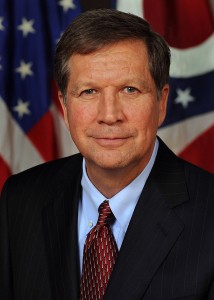 The men were talking a bit loudly, and I don’t think they even realized it. Almost everyone in the restaurant could hear them. In fact, a lot of people were obviously listening.
The men were talking a bit loudly, and I don’t think they even realized it. Almost everyone in the restaurant could hear them. In fact, a lot of people were obviously listening.
“I know what you mean,” the man with the deep voice said. “But I’m seeing something totally different in this election. You’re right that the outsiders like Trump and Cruz are really getting a lot of support. I just don’t think they’re the true outsiders.”
“What do you mean?” the man with the higher voice asked. “Who else is an outsider? Do you mean Bernie Sanders, because he’s a socialist?”
“No, I wasn’t thinking of Sanders,” Deep Voice replied. “But let’s just look at this whole election from a different angle. We’re calling Trump and Cruz outsiders because Trump has never held political office and Cruz is a Tea Party guy who constantly attacks what he calls ‘the Washington Cartel,’ meaning the establishment from both parties. Right?”
“Right.”
“Well, I’m not sure that’s a very good criteria for being an outsider. I think the reason a lot of voters want an outsider this year is because they’re tired of the political establishment, of both parties, and of politicians who get into office and just do more of the same—like the people they replaced. They promise real change, but it doesn’t happen. In fact, a lot of the bad things just keep getting worse, election after election.
“What we need is a real outsider. Not just someone who hasn’t been in office or always attacks other politicians, but someone who is the kind of leader we really want…”
He paused, and Higher Voice asked, “But what do you mean? I’m not sure what your point is.”
Class and Leadership
“Okay,” Deep Voice responded. “I’ll get right to the point. Our politics has become a disaster. The politicians fight all the time. They are constantly attacking each other. Attack. Attack. Attack. And we’re supposed to believe that this is just the way things are.
“But they shouldn’t be this way. We shouldn’t want leaders who are all about attacking people all the time. We vote them into office, and they just keep attacking each other in Washington. That’s not leadership. Not really. If they attacked a lot and then got really important things done, and made a lot of things better, that would be one thing. But that’s not what happens. They attack, and attack, and attack—and that’s pretty much all they get done.
“We need a president who gets the right things done, and who also doesn’t go around attacking people. We need the kind of leader we can look up to, someone who can bring people together in this nation. We’re so divided. So angrily divided. We need a real leader to get the nation back on track.”
Higher Voice replied: “That’s too idealistic…”
“Reagan did it,” Deep Voice interrupted. “He wasn’t the Attacker in Chief. He fought for what he wanted, but he did it with class. Not with name calling. Not with personal attacks. He stayed above that kind of junk. He was too good for it. He fought back, yes. But never by stooping to name-calling and personal vendettas. And that allowed him to lead the nation in big ways, and do big things like bring an end to the Cold War. We need a classy president who is also tough and confident.
“And a truly classy president would be a true outsider, very different from the attacking years of Bush, Clinton, Bush, and Obama. Just look at the 2008 election. We watched Obama and Hillary attack each other mercilessly in the campaign and debates, and we should have realized right then what kind of president Obama would be.
“We need a real change. And I don’t think that means making our politics even more focused on attacks. It means electing someone who isn’t an attacker. A fighter, yes. But classy, like a true leader.”
Higher Voice sighed loudly. “That’s so far from the current election that I don’t know what you’re proposing. What do you want to happen?”
To Act or To Attack
“First,” Deep Voice said, “let’s divide the candidates into those who attack and those who refuse to get down in the muck and act like jerks. Hillary, Trump, Cruz and Rubio are often on the attack—in the debates, in interviews, in their campaign rallies and speeches. They attack a lot. Regardless of how you feel about their politics, or their reasons for such attacks, they are consistently attacking, attacking, attacking. So put them in the jerk category, at least for this discussion.
“Second, the three candidates who usually aren’t on the attack are Bernie Sanders, John Kasich, and Ben Carson. So if we want a classy president, one whose focus is always on building people instead of tearing them down, it has to be one of them. I really dislike Sanders’ politics, so throw him out of the mix. He’s a socialist, and proud of it, and his proposals would drastically hurt the nation.
“So, third, we’re left with Kasich and Carson. Both are classy. And both go out of their way not to attack other people. They focus on building people up. They really do.
“And before you roll your eyes, really think about what I’m saying. If we want our politics to be built on people acting like jerks and fighting each other—and not really improving our nation—we should keep electing people who attack, attack, attack.
“But if we want real change, the kind that we can truly be proud of, we need to change the way our top leader acts. We need class. Depth. Virtue. We need a Washington, a Lincoln, a real leader. Tough, yes. But focused on building others, not attacking them.
“You can call this idealistic if you want, but what I’m saying is true! If we don’t have a true leader, a classy, uplifting Reaganesque example that we can tell our kids to emulate, we haven’t put our best leader in the Oval Office. Imagine telling your 12 year old son: ‘Be like Donald Trump’ or ‘attack people like Ted Cruz—as long as you win, it’s okay.’ Or even: ‘If you get behind, like Marco Rubio, find out everything bad you can about the other person and loudly tell everyone.’
“Ridiculous. We need a real president. And both Carson and Kasich are the kind of men you can tell your children to emulate. To be proud of. To follow—even into battle and death if necessary to defend our nation. To admire.
“We’ve become so used to something less that the highest character in our leaders that we seem ready to accept mediocrity in character and behavior and simply shrug it off. We need to do better than that!”
The Question of Class
Higher Voice interrupted: “I just don’t think Carson has enough experience in doing the kinds of things a president has to do.”
“Maybe he doesn’t. Or maybe he does. His understanding of freedom principles is deep, like Cruz or Rand Paul, and he might surprise you. But let’s say you’re right, just for the sake of argument. That still leaves Kasich…
He paused. Then he spoke a bit more quietly, and I noticed people leaning forward to hear. “John Kasich is everything you would want a president to be in terms of character. He’s classy to the core. He’s a man of principle and morals. And he never attacks others to tear them down or try to get himself ahead. Not ever. When others attack him, he answers their charges, clarifies the truth, and then turns to the policies our nation needs. Like Carson.
“Kasich doesn’t do what Trump, Hillary, Cruz and Rubio frequently do in the same situations—start counter-attacking whoever attacked them. When the media tries to get him to attack, he refuses. He consistently calls us to our better angels, as Madison put it.
“Kasich is classy like Reagan. He’s above petty name-calling and attacks like Reagan. He focuses on building people. Pretty much always. Yet his history proves that when it’s time to fight—against real enemies, like terrorists—he doesn’t shrink or back down. He is deeply principled. Again, like Reagan.
“But here’s the real kicker. Kasich is actually the most experienced leader out of everyone running for president. He was the architect of balancing the U.S. budget in the 1990s. He led it, and he planned out the details. He knows how to balance our national budget! He’s already done it once. Nobody else can say that. Bill Clinton and Newt Gingrich took credit for negotiating it, but John Kasich ran the numbers and developed the plan.
“He also balanced the budget of Ohio as governor. He started out with a major deficit, and turned it around very quickly. And made it last. Nobody else in the race has ever done that—with a state, or with the United States. Only Kasich has done it. Twice!
“He also served on committees that oversaw military and international affairs, and has more national defense experience than anyone else running for president, including Hillary Clinton. And beyond all this, he’s a true conservative, and has been for decades. He also worked many years in private business as a leader—he’s not just some lifetime politician.”
America The Great, Again
Higher Voice asked: “Why hasn’t he caught on with the voters?”
“I’m not sure,” Deep Voice replied. “Part of it is probably that he’s not loud and constantly attacking people. Part of it is probably that a lot of voters don’t really know much about him. I’m not sure. He did do well in New Hampshire, and the race is far from over.”
He paused. Then kept talking: “Kasich has class. He has dignity. He is the kind of person we can look up to and tell our kids to look up to—and mean it. He’s tough. He’s a proven leader. But he’s really, really nice. And, again, he’s the only person in the race who has ever balanced a major government budget, and he’s done it at both the state and the national levels. That’s huge!
“I’ve really given this a lot of thought and research. Go back and read Kasich’s speeches. He’s the kind of man who would tell Mr. Gorbachev (or Putin) to ‘Tear down this wall!’ He’s the real deal.
“Conservatives need to step back, take a deep breath, and give Kasich another look. If we want the kind of America that truly is great again, we need the right kind of leadership. And that means the right kind of leader! A true leader, one who isn’t just going to get the job done but who’ll get it done with class, dignity, and an infectious smile.”
I left the restaurant mentally kicking myself. In all my reading and watching of the election, over many months, I hadn’t done what I always tell others to do—really go study the records, writings, and speeches of all the candidates. Really get to know them. At least, I hadn’t done this with Kasich. I’m remedying that.
Category : Aristocracy &Blog &Community &Constitution &Culture &Current Events &Economics &Featured &Foreign Affairs &Generations &Government &History &Independents &Leadership &Liberty &Politics &Statesmanship
America All Alone! by Oliver DeMille
February 19th, 2016 // 4:30 pm @ Oliver DeMille
A Big Picture Look at the World in Twenty Years
The Shift
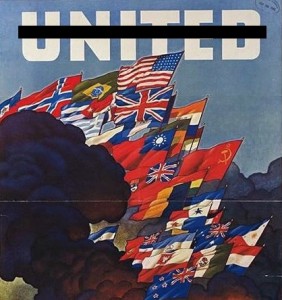 For more than a century America has enjoyed the luxury of strong allies in Europe. When problems came, as they always do, many European and North American nations relied on each other for strength, leadership, even rescue.
For more than a century America has enjoyed the luxury of strong allies in Europe. When problems came, as they always do, many European and North American nations relied on each other for strength, leadership, even rescue.
This was certainly the case in World Wars I and II and the Cold War from the 1960s thru the 1990s. Nobody alive today remembers a time when America was alone in the world.
Yet such a world is rapidly emerging. The main reason for this dangerous development is the massive and truly tragic decline of Europe. Most people don’t realize this is occurring, or just how significant it is.
A few pundits warn that this may be Europe’s last century as a great power—as leadership shifts from the Atlantic powers (Britain, France, Germany, Italy, the United States, Canada, etc.) to the Pacific Rim nations (China, Russia, India, North America). This shift is inherently problematic—the U.S. and Canada are trading European allies (nearly always friendly) for more belligerent and totalitarian foes in Moscow and Beijing.
Huge difference. And this will undoubtedly bring even greater difficulties whenever problems arise and help is needed. Russia and China each see themself as the top emerging superpower. India is a close third.
In times of trouble, where will America turn for support?
The truth is even worse than the pundits let on, however. The idea that this is Europe’s last great power century is overly optimistic. If current trends continue, no nation in Western Europe is likely to act as a major power after 2030. Certainly not beyond 2050, and possibly not even after 2020.
Downward Spiral
This will catalyze a tectonic shift in global affairs, and the ramifications of the change are already beginning.
But what exactly is happening in Europe to bring about such rapid decline? The answer is a warning to Americans, if we will heed it.
1) Terrorism
Terrorism has taken root in Europe. European nations are quickly becoming like Israel, Saudi Arabia, Yemen or other Near Eastern and North African states in terms of an underground but steady terrorist presence. This will only deepen and grow, unless something drastic occurs.
2) Refugees
The influx of refugees last year, this year, and likely for the next few years ahead will only exacerbate the incidence and proximity of terrorism. Certainly not all, or even most, of the refugees are terrorists. But a few are. That’s a major problem. The whole point of terrorism is that a very few can drastically impact the many.
3) Population Decline
Birthrates are rapidly changing the European electorate. Birthrates for traditional Europeans are down—in some cases negative—while birthrates for immigrants living in Europe are high. Democratic institutions are quickly changing as a result.
4) Debt
Debt is skyrocketing in the poor European nations, roughly two-thirds of the continent. The pattern of Greece is spreading.
5) Societal Decline
A general lack of innovation has settled over the continent. This is reinforced by a widespread and growing belief in high levels of government regulation in nearly every sector of society. Financial capital is moving elsewhere, increasing unemployment and further convincing voters to elect big-regulation candidates.
6) Leadership Gap
As a result of the fifth problem above, Europe is experiencing an era of lackluster leadership. Private sector leaders of all types are increasingly powerless in a big-government environment, and those in government were elected to regulate rather than lead. The bureaucracies are swelling (along with the costs), but strategic national thinking has become rare. This further fuels debt problems.
All of this was avoidable at one point, but we have long since passed the likelihood of any kind of serious turnaround. It now appears to be a downward spiral.
A New Path
Again, the United States and Canada aren’t far behind Europe in this pattern. Perhaps a decade, if the U.S. stays on its current path. Two decades at the most. But we still have time to reverse course.
Will we? The answer is very much in doubt.
In any case, Russia and China are attempting a major rise just as Europe is losing much of its vitality and strength. This puts North America in a tight spot.
If the U.S. needs strong, committed allies ten or twenty years from now, we may be out of luck.
Perhaps it is time for an entirely new strategic approach toward Mexico, Brazil, Argentina and the rest of Latin America. This may be source of future allies. It is certainly time—past time—for a serious return to the principles of freedom and free enterprise, along with a renewed adherence to the U.S. Constitution, in the United States.
At this point, the U.S. is charting a European-style course to join Britain, France, Germany, and Italy in their decline. President Obama has been an open proponent of a more Europeanized governance.
It goes without saying that this is a bad choice. Likewise, following the Chinese or Russian strategy is also the wrong approach.
It is time for America to chart its own direction, one based on a major refocus on freedom, free enterprise, and Constitutional values, as mentioned. Any other direction—any other direction —is a sure path to our decline.
Interested in Oliver’s works on freedom, forms and how to mend society?
Check these out:
 1913: The Year We Failed America…And How to Recover Her for Good
1913: The Year We Failed America…And How to Recover Her for Good- We Hold These Truths to be Self-Evident: 12 Natural Laws of Freedom, Progress and Success
- Freedom Matters: The Connection Between Career, Business and Freedom
- The U. S. Constitution and the 196 Indispensable Principles of Freedom: Writing Constitutions in the 21st Century
- The Freedom Bundle
Category : Aristocracy &Blog &Citizenship &Community &Constitution &Culture &Current Events &Economics &Featured &Foreign Affairs &Generations &Government &History &Leadership &Liberty &Politics

